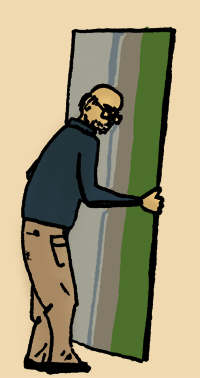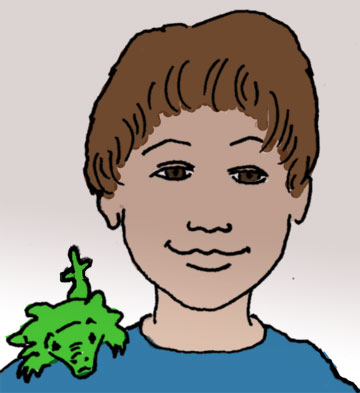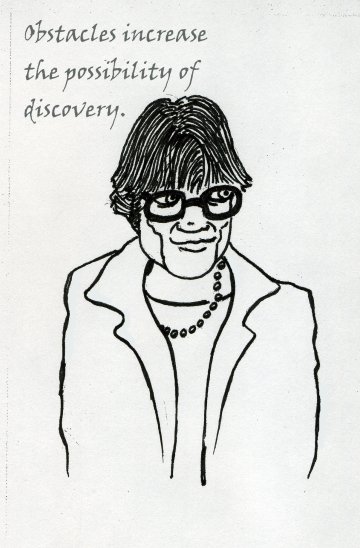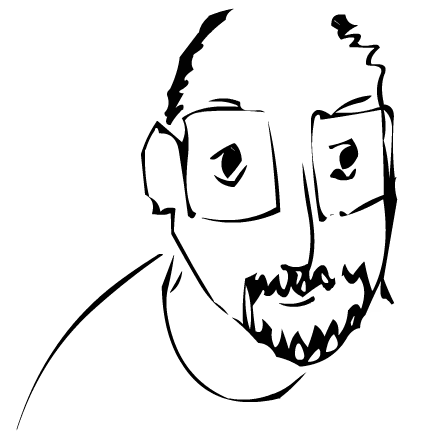Chip tunes are songs composed of sounds from video games.
Chip tune artists' sites:
micromusic.net
solipsistic nation
8 bit peoples
8 bit weapon
I found out about chip tunes from the small world podcast.
Saturday, December 30, 2006
Thursday, December 28, 2006
Friday, December 15, 2006
Double Meanings
Through an acquaintance with literature one can learn to appreciate the ironic and often humorous art of double meanings. A recent commercial example of a double meaning in action is VISA's use of the word "take" in its current ad campaign.
A recent and more serious literary example is the title of Brian Vaughan and Niko Henrichon's graphic novel, Pride of Baghdad

Take that, monosemous literalism!
A recent and more serious literary example is the title of Brian Vaughan and Niko Henrichon's graphic novel, Pride of Baghdad

Take that, monosemous literalism!
Another Good One
"Thanks for inspiring me to be true to myself in my writing."
- Words written by a student in Advanced Composition reflecting on the lessons of a semester.
- Words written by a student in Advanced Composition reflecting on the lessons of a semester.
Thursday, December 14, 2006
A Nice Moment
It's always flattering when a student asks, "Are you teaching a writing course next semester?"
Sunday, December 10, 2006
Thursday, December 07, 2006
So What Else Is New
With all these blogs and feeds everywhere, I find myself always wanting "what's new". I think today I'll take a step back. I think today I'll review, reread, relisten to something not new for a change.
Wednesday, December 06, 2006
Sunday, December 03, 2006
Pixel Painting Fool!
Pixelgod Raffaele Picca shows what a pro can do with a simple graphics program like MS Paint. My hero!
Saturday, December 02, 2006
On Composing with New Media
In South Dakota Universities, the curriculum cycle is in full swing. This means that even as I type this, faculty members across many disciplines are designing new programs, doing their best to match their teaching to a rapidly changing world.
The faculty members in our college are no exception. The College of Arts and Sciences at Dakota State University has for a long time been known as a place of mixed media, a place where the interests of academic disciplines meet and mingle with the latest in technology and content production techniques.
In the past we of the "writing faculty" thought long and hard about how the questions and awarenesses of English studies, of literary interpretation and English Composition, might embrace desktop publishing software, text analysis programs and web authoring tools. But when we did think these thoughts, it was always with the sense that these tools were somehow specialized and most likely to be employed by undergraduate majors who would use such tools in their professional careers.
Well, that's not the world we live in anymore. Today, twelve year olds are editing music videos. Nine year olds are posting podcasts. The means of producing "new media" is in the hands of anyone with a computer and an internet connection.
Given the ubiquity of digital media, and the ease of its production, we are looking a bit differently at the interplay of these things and the interests of our discipline. If, as the National Council of Teachers of English has proposed, we live in a time when a "broader" definition of Composition that embraces "multimedia" is not an option but a necessity, how, we are wondering, can we effectively integrate video, audio, image, hypertext, text, and whatever comes next (3D modeling, anyone?) into our own projects and the work we do with our students?
My colleague John Nelson is taking his first steps toward this brave new world and has asked his students to create animated slideshows with spoken narrative and music in the mix. To show he students the sort of thing he's looking for, he made one himself. Here it is:
Listening to John's story I was struck by what he said about raising kids in the presence of "electronic babysitters". I found myself wondering if my own son is too "distracted" by the videos he watches on tv. I try to talk to him about what he sees, but sometimes I can't help thinking that he'd be better off without the box. These thoughts moved me to make this video in return:
My movie doesn't have a spoken narration like John's. I told my story with pictures and titles and music. John kept his focus on the essay he wrote and read to go with his pictures and soundtrack. Ironically, I went "non-printcentric" and let other elements do the talking for me.
Both approaches to digital storytelling are valid forms of expression. So is a simple line drawing like this one I just drew myself:
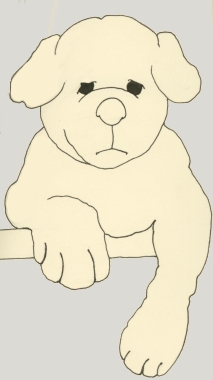
Or, g-d forbid, a novel.
All these forms can coexist. Each one offers itself as a medium for worthy objects of study and a worthy vehicle for the articulation of worldviews. At this point, it seems, the thing to do is to put ourselves and our discipline out there, to hang on to our questions and see what happens next.
The faculty members in our college are no exception. The College of Arts and Sciences at Dakota State University has for a long time been known as a place of mixed media, a place where the interests of academic disciplines meet and mingle with the latest in technology and content production techniques.
In the past we of the "writing faculty" thought long and hard about how the questions and awarenesses of English studies, of literary interpretation and English Composition, might embrace desktop publishing software, text analysis programs and web authoring tools. But when we did think these thoughts, it was always with the sense that these tools were somehow specialized and most likely to be employed by undergraduate majors who would use such tools in their professional careers.
Well, that's not the world we live in anymore. Today, twelve year olds are editing music videos. Nine year olds are posting podcasts. The means of producing "new media" is in the hands of anyone with a computer and an internet connection.
Given the ubiquity of digital media, and the ease of its production, we are looking a bit differently at the interplay of these things and the interests of our discipline. If, as the National Council of Teachers of English has proposed, we live in a time when a "broader" definition of Composition that embraces "multimedia" is not an option but a necessity, how, we are wondering, can we effectively integrate video, audio, image, hypertext, text, and whatever comes next (3D modeling, anyone?) into our own projects and the work we do with our students?
My colleague John Nelson is taking his first steps toward this brave new world and has asked his students to create animated slideshows with spoken narrative and music in the mix. To show he students the sort of thing he's looking for, he made one himself. Here it is:
Listening to John's story I was struck by what he said about raising kids in the presence of "electronic babysitters". I found myself wondering if my own son is too "distracted" by the videos he watches on tv. I try to talk to him about what he sees, but sometimes I can't help thinking that he'd be better off without the box. These thoughts moved me to make this video in return:
My movie doesn't have a spoken narration like John's. I told my story with pictures and titles and music. John kept his focus on the essay he wrote and read to go with his pictures and soundtrack. Ironically, I went "non-printcentric" and let other elements do the talking for me.
Both approaches to digital storytelling are valid forms of expression. So is a simple line drawing like this one I just drew myself:

Or, g-d forbid, a novel.
All these forms can coexist. Each one offers itself as a medium for worthy objects of study and a worthy vehicle for the articulation of worldviews. At this point, it seems, the thing to do is to put ourselves and our discipline out there, to hang on to our questions and see what happens next.
Subscribe to:
Posts (Atom)
